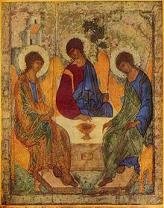 As I presented in the last issue of this article, the Fathers, while seeing God as Three-In-One, the three-fold number is not, as we commonly understand it, a quantity. For truly, when it relates to the indivisibly united divine hypostases (i.e., Persons), the sum of which is always the unity, 3 = 1, it expresses the ineffable order within the Godhead.
As I presented in the last issue of this article, the Fathers, while seeing God as Three-In-One, the three-fold number is not, as we commonly understand it, a quantity. For truly, when it relates to the indivisibly united divine hypostases (i.e., Persons), the sum of which is always the unity, 3 = 1, it expresses the ineffable order within the Godhead.
The contemplation of this absolute perfection, of this divine plenitude which is the Trinity – God who is personal and who is not a person confined in his own self – the very thought, a mere pale shade of the Trinity, lifts the human soul beyond the world of being, changing and confused, in bestowing upon it this stability in the midst of passions. This serenity, which is the beginning of deification. For the creature, subject to change by nature, can by grace attain to the state of eternal stability; can partake of infinite life in the light of the Trinity. This is why the Church has defended so vehemently the mystery of the Holy Trinity against the natural tendencies of the human mind, which strive to suppress it by reducing the Trinity to unity, in making it an essence of the philosophers with three modes of manifestation, or even by dividing it into three distinct beings, as did Arius.
I know that this may be difficult to understand. The reality of God as Trinity is truly necessary, the Church has believed for centuries, in order to say that Jesus is both God and man. You may ask how this is possible. That is the wrong question when thinking about God. All things are possible with God, that is Who He Is by our very conception of God. The Church, in expressing Who she believes God is, has declared the consubstantiality of the Three – they are of the same substance – the mysterious identity of the monad and of the triad. Indeed she has declared her belief that God is of one nature while having three distinct hypostases or persons.
It required the superhuman efforts of an Athanasius of Alexandria, of a Basil, of a Gregory Nazianzen and of many others, to purify the concepts of Hellenistic thought and then apply them to their understanding of Who God Is. The Church found that their expression of Who God Is, truly matched the experiences of the followers of Jesus, the Christ.
If you pay close attention to the prayers of the Divine Liturgy, you will find that sometimes we address the Father, other times the Son or Spirit and always ending with God as Three-In-One.
